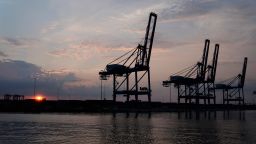Science
Trump’s Tariffs Push African Economies Closer to China

The tariffs imposed by US President Donald Trump are reshaping trade dynamics in Africa, pushing several countries towards increased reliance on China. With tariffs ranging from 15% to 30% on exports to the United States, African nations are now navigating a complex economic landscape where Chinese offers of support have become increasingly attractive.
Countries like Libya, South Africa, Algeria, and Tunisia are among those facing the steepest tariffs, prompting concerns about economic stability. Economists warn that this shift may have long-lasting consequences for the continent. According to Nigerian economist Bismarck Rewane, the situation represents a troubling trend: “We (Africa) are going straight into the hands of China.”
Impact of the Tariffs on African Economies
The tariffs were initially introduced under the premise of addressing trade deficits with the US. However, they have disproportionately affected African nations, which had been attempting to negotiate favorable trade terms prior to the implementation of these charges. The modified tariff package released by the White House highlights that eighteen African countries now contend with a 15% levy, while the aforementioned four face rates as high as 30%.
In response to the tariffs, South Africa has formally challenged the decision, arguing that Trump’s claims about trade data do not accurately represent the reality on the ground. The US’s failure to negotiate trade agreements with African nations before the tariffs were enacted underscores a lack of prioritization for the continent in US foreign policy.
The repercussions are already evident, especially in smaller economies like Lesotho, which recently saw a reduction in tariffs but still faces a significant 15% charge. Prime Minister Samuel Matekane noted that the combination of high tariffs and the cessation of US aid has devastated industries that once provided thousands of jobs. Lesotho’s reliance on the US market, which saw over $240 million in trade last year, highlights the precarious nature of its economic situation.
China Steps In
As African nations grapple with these challenges, China has positioned itself as a potential ally. In June, China announced plans to suspend tariffs on imports from nearly all African countries, presenting an opportunity for increased trade between developing nations. Researcher Neo Letswalo emphasized the need for African countries to pivot towards China, suggesting that now is the time to strengthen South-South trade.
Despite the allure of Chinese support, experts caution against over-reliance on Beijing. Letswalo pointed out that while diversifying trade relationships is essential, African countries must also be wary of imbalanced trade deals that could favor Chinese exports over local industries. The China-Global South Project has documented various instances of trade deficits skewed heavily in China’s favor, raising alarms about the long-term implications for African economies.
While South Africa seeks alternative markets, particularly in light of the looming tariffs, it faces challenges in finding suitable replacements for its citrus exports, which have gained popularity among US consumers. The Citrus Growers’ Association has warned that thousands of jobs are at risk if the tariffs are enacted, emphasizing the critical need for access to the US market.
As the continent navigates a complex web of tariffs and trade relationships, the question remains whether Africa can leverage its economic challenges into opportunities for greater independence. The African Continental Free Trade Area (AfCFTA) was established in 2020 to promote intra-Africa trade, yet implementation has been slow, with just over 20 of the continent’s 55 nations currently participating. Rewane believes that the current crisis could serve as a catalyst for Africa to build economic resilience and reduce dependency on external markets.
As the landscape continues to evolve, the focus remains on how African nations will respond to the challenges posed by US tariffs and the opportunities presented by China. Emphasizing the need for a balanced approach, Letswalo advocates for a domestic focus while engaging with global markets. The future of Africa’s trade relationships hangs in the balance as nations seek to navigate these turbulent economic waters.
-

 Lifestyle3 months ago
Lifestyle3 months agoLibraries Challenge Rising E-Book Costs Amid Growing Demand
-

 Sports3 months ago
Sports3 months agoTyreek Hill Responds to Tua Tagovailoa’s Comments on Team Dynamics
-

 Sports3 months ago
Sports3 months agoLiverpool Secures Agreement to Sign Young Striker Will Wright
-

 Lifestyle3 months ago
Lifestyle3 months agoSave Your Split Tomatoes: Expert Tips for Gardeners
-

 Lifestyle3 months ago
Lifestyle3 months agoPrincess Beatrice’s Daughter Athena Joins Siblings at London Parade
-

 World3 months ago
World3 months agoWinter Storms Lash New South Wales with Snow, Flood Risks
-

 Science3 months ago
Science3 months agoTrump Administration Moves to Repeal Key Climate Regulation
-

 Science2 months ago
Science2 months agoSan Francisco Hosts Unique Contest to Identify “Performative Males”
-

 Business3 months ago
Business3 months agoSoFi Technologies Shares Slip 2% Following Insider Stock Sale
-

 Science3 months ago
Science3 months agoNew Tool Reveals Link Between Horse Coat Condition and Parasites
-

 Sports3 months ago
Sports3 months agoElon Musk Sculpture Travels From Utah to Yosemite National Park
-

 Science3 months ago
Science3 months agoNew Study Confirms Humans Transported Stonehenge Bluestones









